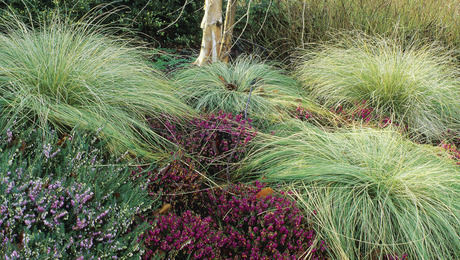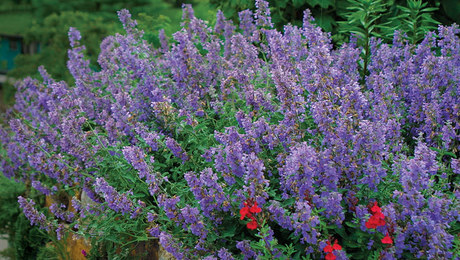Ground covers may be the most underappreciated plants in the garden. They don’t have the flashiest blooms or the most interesting habits, but they’re invaluable in so many other ways. A great ground cover can crowd out weeds, stop erosion, fill in the gaps between larger perennials, and even soften the edges of walls and curbs. However, not all ground covers are created equal. The best ones require little care, look great in multiple seasons, and mass out quickly.
When many folks think about ground covers, a slew of unimaginative, often aggressive plants comes to mind. If your idea of a ground cover is periwinkle (Vinca minor*, Zones 4–8) or Japanese pachysandra (Pachysandra procumbens, Zones 5–9), you may be surprised to know that there are ground covers that flower beautifully, have great texture, and spread politely. This video highlights a few favorites from the gardens of the Fine Gardening editors, including a gorgeous ground cover rose, a surprisingly tough native shrub, and a shade-loving perennial that looks like an aquatic plant.
Great ground covers
‘Foxley’ thyme (Thymus pulegioides ‘Foxley’): This creeper has fragrant, variegated foliage that gets splashes of bright pink in spring. In summer, pink blooms cover the billowy mounds.
‘Karmina’ geranium (Geranium × cantabrigiense ‘Karmina’): This long-blooming beauty can take sun and shade, making it one of the most utilitarian perennials out there.
‘Angelina’ sedum (Sedum rupestre ‘Angelina’): If you’re looking for the toughest ground cover possible, look no further. This succulent tolerates lean soil and dry conditions.
European ginger (Asarum europaeum): The glossy leaves of the shady character are incredibly eye-catching.
Low Scape Mound® aronia (Aronia melanocarpa ‘UCONNAM165’): Native plants are always a great addition to the garden, and when they are as tough and beautiful as this ground-hugging shrub, all the better.
White Drift® rose (Rosa ‘Meizorland’): You can rest assured that this beautiful rose will not get covered in pests and diseases like many of its cousins.



















Comments
Log in or create an account to post a comment.
Sign up Log in